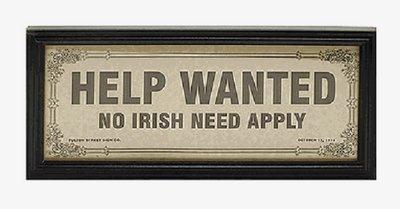Sociologists love to study culture because of the enormous impact it has on the behavior of larger groups of people. Within the study of culture is a term called acculturation. Acculturation is the process that a culture undergoes when the members identify cultural traits and/or behaviors that are common in their culture that may be holding them back or preventing them from succeeding in a given society. They then replace those behaviors, values, beliefs, etc. with others (usually observed in other, more successful cultures) that will lead to a greater chance for success. There are many examples of this in world history. The history of Irish-Catholics in America is one of them.
For centuries, Irish-Catholics in Ireland were treated like second class citizens. Various laws at various times prevented them from owning land, attend higher education, vote, or participate in government. Gaelic, the traditional Irish language, was even outlawed in favor of the English language which the Irish still speak today as a result. This political, economic, and cultural oppression led many Irish-Catholics to develop habits of poor work ethic (why go the extra mile on land that will never be yours?), poor education (why study for tomorrow if you don’t know if you are going to survive today?), prone to violence (if survival is priority #1, I better know how to fight), and heavy drinking (to self-medicate their depressing lives). As a result, when many of my Irish-Catholic ancestors immigrated to America, they brought with them these same cultural habits. It’s not surprising that signs saying “Help wanted: no Irish need apply” appeared in the windows of businesses. Outside of bars, signs that said “No dogs. No women. No Irish” also appeared. Although it was blatant discrimination, we can understand why those signs went up. If you hired an Irish-Catholic, you were more likely to get someone with those bad habits. In the other example, bars certainly did not want people who tended to drink too much and get into fights. Both examples would hurt the businesses that were involved.
History books do a good job of exposing the prejudice and discrimination of this period of American history from the mid-1800’s to the early 1900’s. For many years, this side of American history was largely ignored and needed to be examined. Thankfully, our books made the change. That being said, history books are still missing a key part to this story. In my opinion, an even more important lesson is not found in our textbooks. They do a good job of mentioning that those signs went up but they never ask the next question … How did those signs come down? That’s important because no “anti-discrimination” or “equal opportunity” laws existed at that time. Those are not created until the mid-1900’s. The owners could put up any sign they wanted without penalty. So what caused them to voluntarily take them down?
The answer is acculturation. Because there was going to be no help coming from the government or other ethnicities to address the needs of the Irish, the Irish-Catholics realized they were not going to make it in America unless they made the changes themselves. With the help of the church and strict Catholic schools, over time, the Irish-Catholics began to replace their bad habits with better ones that would enable them to be more successful. It didn’t happen overnight but slowly those signs began to come down. When more and more Irish-Catholics displayed better behaviors, including those that enabled them to be good workers, the need for those signs decreased. No laws were needed to force businesses to remove their signs. Since then, Irish-Catholics have been one of the most successful cultures in American history.
So, what can a student learn from this?
With the marking period coming to a close, some students and parents are slipping towards panic mode. Students on the passing bubble are stressing over whether that last test, assignment, or project will keep them afloat or sink them below the dreaded 65% for the marking period.
Regardless of the grade earned, the closing of the marking period gives every student a good opportunity to reflect on not only their grades but why they received those grades. Unfortunately, the “whys” are often confused. We all know that it is much easier to look at external issues than to give yourself a good look in the mirror. Statements like “The teacher hates me,” “The way my teachers instruct does not match my learning style,” “This school stinks,” and many others are all evidence that many kids are focusing on the external factors that, at least in their own minds, prevent them from being successful. I remember one time in middle school when I tried this same approach on my parents. I had failed a test and explained it to my parents by saying that the teacher was horrible. My father’s answer was one word … “So?” The point was clear. It was my grade and therefore my responsibility to earn that grade regardless of the obstacles I had to overcome. Of course, I hated that answer at the time but I am now thankful my parents took that position. It forced me to look in the mirror and make the necessary adjustments in order to get the grade I wanted in spite of any external “unfairness” that may or may not have existed.
All this is not to say that external issues play no role in our success. However, unlike the Irish-Catholics in America, if you sit around and just wait for others to change instead of addressing your own shortcomings, you are probably going to be sitting for a very long time.


